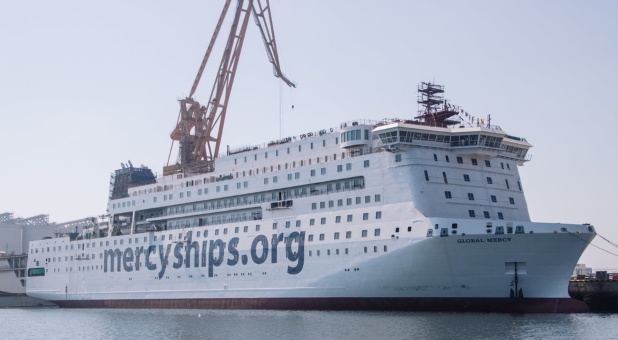New Global Mercy to Set Sail in 2021
Mercy Ships is constructing the world’s largest nongovernmental organization (NGO) hospital ship. She will sail to Africa in late 2021 and will more than double the ministry’s impact through volunteers and services.
When beginning operation, Global Mercy will be the world’s largest NGO hospital ship.
Mercy Ships, a faith-based global organization powered by charitable donors and volunteers, has been providing world-class surgical care to those in need for more than 40 years, free of charge.
“The Global Mercy will be a true modern marvel—a fully custom-built hospital ship with customized instruments, state-of-the-art technology and highly-trained talent of a modern hospital,” said Rosa Whitaker, president of Mercy Ships. “It also represents a unique call to action for anyone called to serve, and it presents the opportunity for people to use their skill set to positively impact global health care.”
Global Mercy will join the current flagship Africa Mercy, which was acquired in 1999 and refurbished for Mercy Ships missions.
According to the Lancet Global Surgery 2030 Report, about 16.9 million people die yearly due to lack of access to surgical care. Over 93% of the population of sub-Saharan Africa does not have access to safe and timely surgery.
As COVID-19 threatens the stability of already fragile health care systems globally, the need to provide basic lifesaving care is greater than ever, especially in low-to-middle-income countries. Global Mercy will deliver a safe and clean environment to various African nations, providing help and resources from some of the most well-trained physicians in the world.
Over the vessel’s 50-year expected lifespan, it is estimated that more than 150,000 lives will be changed onboard through surgery alone.
A Teaching Hospital
In addition to the surgeries, Global Mercy will be outfitted with state-of-the-art training spaces, including a simulation lab with virtual and augmented reality, mannequins and other training tools and simulated post-op care space, which allow trainers to simulate local conditions and limitations to teach best practices in low-resource environments to locals.
The 571-foot, 40,786 short-ton ship will have six operating rooms and house over 600 volunteers from around the globe representing many disciplines including surgeons, maritime crew, cooks, teachers, electricians, the host staff and more. The ship will also feature a 682-seat auditorium, student academy, gymnasium, pool, café, shop and library—all of which have been designed to accommodate up to 950 crew on board when docked in port. {eoa}




























































